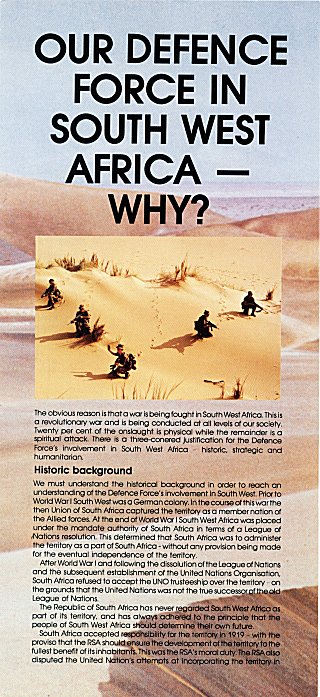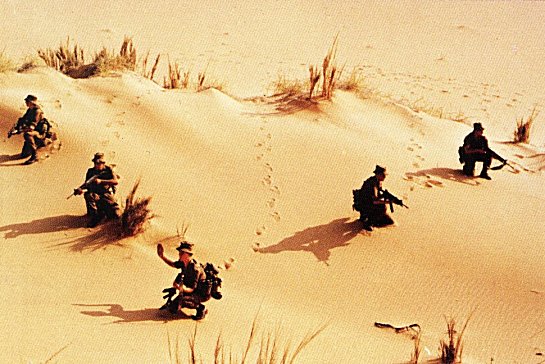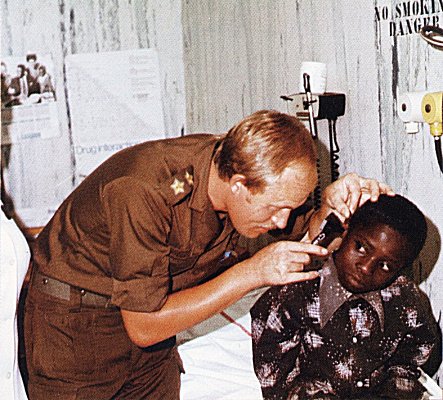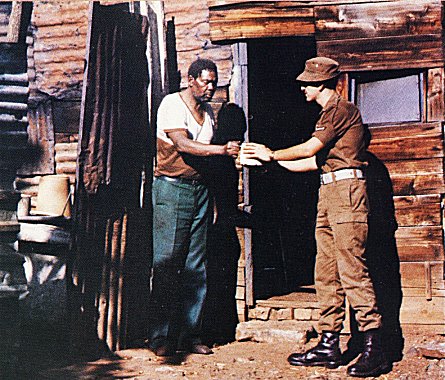OUR DEFENCE FORCE
IN SOUTH WEST AFRICA
- WHY?

This is a copy of a pamphlet that I picked up at Sector 10 in 1987. It reflects the political thought at that time. I've reproduced the text and pictures below for easier reading.
OUR DEFENCE FORCE
IN SOUTH WEST AFRICA
- WHY?

The obvious reason is that a war is being fought in South West Africa. This is a revolutionary war and is being conducted at all levels of our society. Twenty per cent of the onslaught is physical while the remainder is a spiritual attack. There is a three-cornered justification for the Defence Force's involvement in South West Africa - historic, strategic and humanitarian.
Historic background
We must understand the historical background in order to reach an understanding of the Defence Force's involvement in South West. Prior to World War l South West was a German colony. In the courseof this war the then Union of South Africa captured the territory as a member nation of the Allied forces. At the end of World War I South West Africa was placed under the mandate authority of South Africa in terms of a League of Nations resolution. This determined that South Africa was to administer the territory as a part of South Africa - without any provision being made for the eventual independence of the territory.
After World War I and following the dissolution of the League of Nations and the subsequent establishment of the United Nations Organisation, South Africa refused to accept the UNO trusteeship over the territory - on the grounds that the United Nations was not the true successor of the old League of Nations.
The Republic of South Africa has never regarded South West Africa as part of its territory, and has always adhered to the principle that the people of South West Africa should determine their own future.
South Africa accepted responsibility for the territory in 1919 - with the proviso that the RSA should ensure the development of the territory to the fullest benefit of its inhabitants. This was the RSA's moral duty. The RSA also disputed the United Nation's attempts at incorporating the territory in terms of the trusteeship system. The RSA accepts that the people of South West should be given the opportunity to decide their own future.

This dispute between the RSA and the UN has led to allegations that South Africa was guilty of colonialism and imperialism that the RSA was illegally "occupying" the territory and threatening peace and stability in Southern Africa. SWAPO is regarded as the sole representative of the people of South West - despite the fact that the inhabitants nominated their own representatives during the 1978 elections. SWAPO support is limited mainly to the Owamba population - especially the Ndonga and Kuanyama tribes.
The RSA has also indicated a willingness to accept an internationally acceptable settlement in the territory, and has always co-operated vcoluntarily with the UN in order to establish an acceptable future for South West Africa.
SWAPO's refusal to play a comnstructive role in the indepemndence process is one of the main reasons why there has been so little progress between the RSA and the Western Contact Group. The UN plan for SWA is unacceptable to the RSA since it will enable SWAPO to intimidate the people of SWA before and during an election - resulting in a SWAPO victory at the polls.
In addition, the UN cannot be relied upon to remain impartial since this body regards SWAPO "as the sole and authentic representative of the people of Namibia".
The UN's resolution 435 was accepted by all parties as a basis for the independence process. Attempts by the UN and the Western Powers to enforce an SWA inedpendence has reached deadlock. The RSA demands the withdrawal of all Cubans from Angola as a prerequisite for the application of Resolution 435. The RSA believes, should this not come about, that an internal settlement must be reached.
In order to effect this settlement, the RSA will provide a security "umbrella". Under this cover, the people of SWA will have to work out their own political future. The Defence Force's actions and presence in the territory are borne out by the fact that as early as 1972, SWA appealed for assistance in its fight against SWAPO.
Following a specific request by a former executive member of the Legislative Assembly, Chief Filemon Elifas, the then South African Prime Minister, Mr B. J. Vorster, undertook (and it has been frequently repeated) to keep the RSA's security forces in SWA - for as long as their presence was required.
Strategic security reasons
The forces endeavouring to conquer SWA are revolutionary. Their prime, objective is the overthrow of the existing political and social order.
At this stage, South West Africa is not in a position to establish and maintain a subversion free environment. Because of the revolutionary war being fought, the establishment of a climate of peace, stability and order is regarded as essential. If the Defence Force were to depart, the people of SWA would be at the mercy of armed SWAPO terrorists.
For this reason, the Defence Force's presence is essential for the establishment of a peaceful and subversion free environment in which problems may be solved.
An acceptable solution is also in South Africa's interests. A SWAPO victory will give impetus to other revolutionary movements - including those presently active in the RSA. This will increase the revolutionary climate in the Republic. The perceptions of these groups, their supporters and their potential supporters play an important role in the conflict.
Furthermore, a SWAPO victory will bring revolutionary forces, including such foreigners as the Cubans in Angola, right to-the borders of the Republic.
South Africa's involvement is the only realistic possibility of a positive solution since it is futile to expect other foreign countries to remain impartial.
Our humanitarian responsibilities?
The people of South West have all along been our people. Since 1919, when SWA became a mandate territory of South Africa, the bond between the two peoples has been strong.
It would be immoral to hand these people over to the tender mercies of armed SWAPO forces. It is our duty to heed the request by the people of South West and to protect them against revolutionary forces. This will enable them to find their own solutions.
The withdrawal of the SADF from South West Africa - followed by the inevitable SWAPO takeover - will mean that we have yielded to terrorism. Other terrorist groups will take heart from these developments and will attempt the same strategy. Further bloodshed will be inevitable. Our withdrawal will be a disservice to all mankind and will place us in conflict with our Christian philosophy and way of life.
In SWA the Defence Force is also rendering educational, agricultural, health and technical assistance. This contribution by the SADF is essential, and withdrawal will mean the collapse of many essential services. It is true to state that the SADF has raised the standard of living for the people of SVVA.
The Defence Force's presence in South West is a reality. We will remain for as long as the people of SWA require our presence. It is our moral duty to ensure that a peaceful atmosphere prevails in which SWA may find solutions for its problems.

Here is a short cut back to The Sentinel Projects Home Page.

